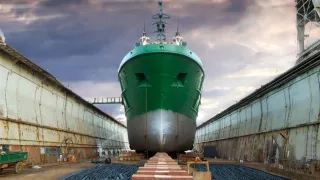VTT has started the SusFlow research project in cooperation with the University of Turku. The goal of the project is to promote the development of the shipbuilding network into a more transparent, sustainable, and environmentally friendly direction by supporting the suppliers of ship projects to develop more diverse processes and solutions.
The Sustainability Through Information Flows (SusFlow) project is an interdisciplinary approach to collecting sustainability information from the shipbuilding network and utilizing it throughout the entire life cycle of a vessel. The project promotes the collection of sustainability information from production and improves the information flow between supply chain network actors, increasing the network's ability to report on sustainability according to tightening standards.
The project maps out strategic and operational capabilities of different shipbuilding network companies in producing and sharing sustainability information. The aim is to identify ways in which stakeholders can be supported in developing technical and computational processes so that sustainability information, such as carbon footprint and other indicators, can be communicated from one level of the supply chain network to another. This way, the overall sustainability impact during the construction phase, for example, can be known in the later stages of the vessel's life cycle.
”VTT is able to utilize its strong expertise in environmental sustainability and development of network life cycle assessments in the project,” says project manager Saara Hänninen.
The cooperation of network companies promotes the Finnish maritime industry
The research project also investigates ways in which the network can communicate and influence customer and stakeholder expectations and requirements regarding responsibility so that commitment to responsibility objectives can be expected from project participants. Additionally, the project examines the possibilities of new technology in demonstrating sustainability.
“Finnish industrial companies already operate responsibly, for example, in terms of energy consumption. However, information must be shown forward, and readiness for transparency must be developed for the supplier network. By improving transparency, stakeholders can more effectively target their own development measures so that the carbon footprint of a cruise ship could be reduced during its operation as well. This is needed on the way towards a carbon-neutral vessel,” says Teijo Lehtonen, the responsible director of the project at the University of Turku.
Strategic cooperation between network companies promotes the Finnish marine industry's position as a global trendsetter and helps it respond to and influence tightening responsibility requirements. Developing and communicating new ideas originating from the domestic network into prevailing practices in the industry is key.
The main funder of the SusFlow project is Business Finland, and it is related to the NEcOLEAP leading company ecosystem program led by Meyer Turku, with the aim of developing a carbon-neutral cruise ship. The research partners in the project are the University of Turku and VTT Technical Research Centre of Finland Ltd. The company partners are Evac Ltd, Meyer Turku Ltd, Lautex Oy, NIT Naval Interior Team Ltd, ALMACO Group Ltd, Smartpipe System Ltd, Piikkio Works Ltd, SSAB Europe Ltd, Semantum Ltd, Paattimaakarit Ltd, Royal Caribbean Group, and the Finnish Marine Industries association.
"In our network at Meyer Turku shipyard, there are over a thousand direct supplier companies, and most of the value of the cruise ship being built comes from our network. Therefore, these companies have a significant impact on all aspects of sustainability. Sustainability is an important part of our competitiveness. The SusFlow research project will promote transparency, measurability, and implementation of sustainability at both the shipyard and network company levels," says Jami Kuusisto, Product Development Engineer at Meyer Turku.

